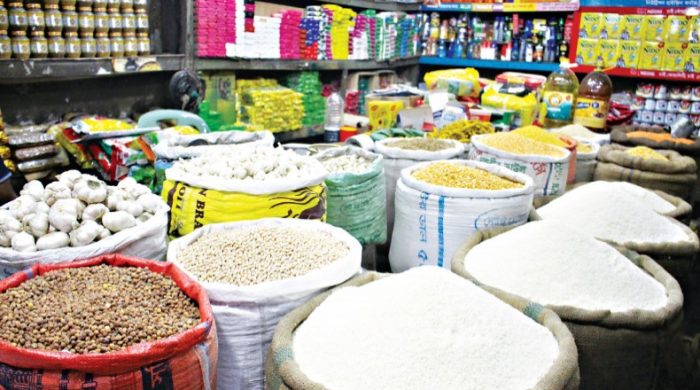Commodity prices keep rising ahead of Ramadan

- Update Time : Tuesday, February 27, 2024
- 34 Time View

The prices of some of the essential commodities, including onion, sugar, pulses, eggs, and spices, have continued to rise in the kitchen markets in Dhaka ahead of Ramadan, the fasting month for Muslims beginning in the second week of March.
Although the traders in a recent meeting assured the government that the stock of Ramadan essentials remained sufficient and the prices would remain stable, the market situation suggested otherwise.
Amid the soaring prices of essential commodities, traders have decreased the supply of sugar in the market for the past three days, retailers alleged.
On February 8, the government reduced import duties on rice, edible oil, sugar, and dates, aiming to ease the prices of the commodities ahead of Ramadan, but consumers hardly benefited from the initiative as the prices of sugar and dates kept rising while the prices of rice and edible oil remained fixed at high prices.
The commerce ministry claimed that imports of most of the essential commodities except sugar increased in December 2023 and January 2024 compared to the corresponding month a year ago.
Importers claimed that the global prices of some of the imported commodities decreased slightly, but the cost of imports increased significantly due to the depreciation of the taka against the dollar and the price hike of power and energy in the country.
After reducing import duty on commodities, the government and importers analysed the effect of the duty cut and reduced the price only for soya bean oil.
State minister for commerce Ahsanul Islam Titu announced on February 22 that the price of soya bean oil would be decreased to Tk 163 a litre from the current price of Tk 173 a litre.
Businesses are yet to release import consignments of sugar after the import tax was reduced, and the price of the commodity would be determined after releasing the item as per the reduced tax, he said.
The state minister also said that businesses assured him that the supply and prices of imported commodities would remain stable during Ramadan.
‘If anyone tries to manipulate the market, the government has many tools to take action against the person,’ Titu warned.
He also said the government was looking to keep the prices of essentials low, not through policing but by ensuring supply.
Prime minister Sheikh Hasina repeatedly warned against hoarders, and recently she said that people should take action against the hoarders and manipulators of the price of essential goods.
On February 23, the prime minister blamed anti-government forces for increasing the prices of essential commodities through hoarding to create unrest in the country.
Market experts said that amid the growing inflation, the prices of essential commodities were not always determined by the availability of supply, as inflation usually increased the profit expectations of businesses.
They also suggested that the government should enter the supply chain to influence commodity prices.
Surely, some of the traders are taking advantage of the situation, and the government will have to
ensure efficient mechanisms in the market to foil the coalition of profit mongers, they said.
According to government data, the prices of onion, sugar, pulses, and gram continued to rise in the past month.
The price of onion has increased by more than 35 per cent in the past month, and the item sold for Tk 110–120 a kilogram on the city markets on Monday.
The price of sugar decreased slightly in the market two weeks ago, but commodity prices have witnessed a further rise in the past three days.
The Trading Corporation of Bangladesh data showed that the price of sugar increased by Tk 5 in a week and the item sold for Tk 140–145 on Monday, but the actual retail price topped Tk 150 a kilogram on the markets in the city.
Mizanur Rahman, a retailer at Karwan Bazar kitchen market said that the wholesale price of sugar increased to Tk 142 a kilogram from Tk 138 a kilogram in the past three days, and suppliers decreased the supply of the item.
The price of gram increased by Tk 10–15 per kilogram in the past month, and the item sold for Tk 100-115 per kilogram.
The price of beef increased by Tk 50–80 a kilogram in the past month and the item sold for Tk 750-770 a kilogram on the city markets.
The price of the broiler increased by Tk 10 in the period, and it was sold for Tk 200–210 per kilogram.
The price of eggs has also maintained an upward trend in the past month.
Consumers Association of Bangladesh president Ghulam Rahman told New Age on Monday that without controlling inflation, the prices of commodities would not come down.
Insisting that inflation always fuels the profit expectations of traders he said timely intervention by the government was needed to check inflation.
The proverb a stitch in time saves nine could be the perfect example of the current situation, as the government failed to take timely initiative to tame inflation, he said.
He suggested that the government should increase competition in the market to ensure reasonable prices for commodities.
He also said that the government would have to be part of the supply chain to keep the prices of essentials under control.
Abdul Bayes, a former professor of economics and vice chancellor of Jahangirnagar University, said that there was a syndicate in the market and the government would have to take the initiative to foil the uneven activities of the section of traders.
He suggested the enforcement of market regulations to ensure stability, saying that temporary market intervention would not bring any solution.















